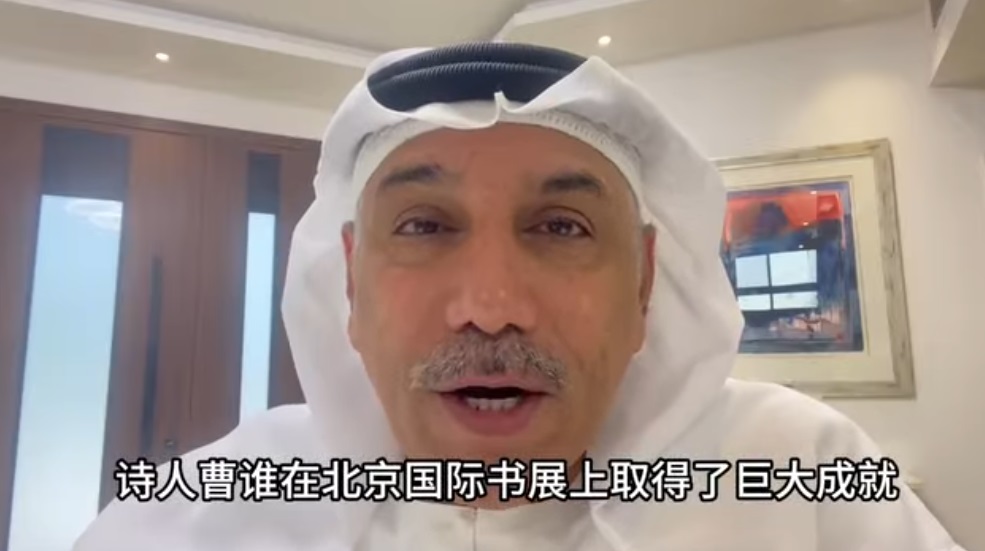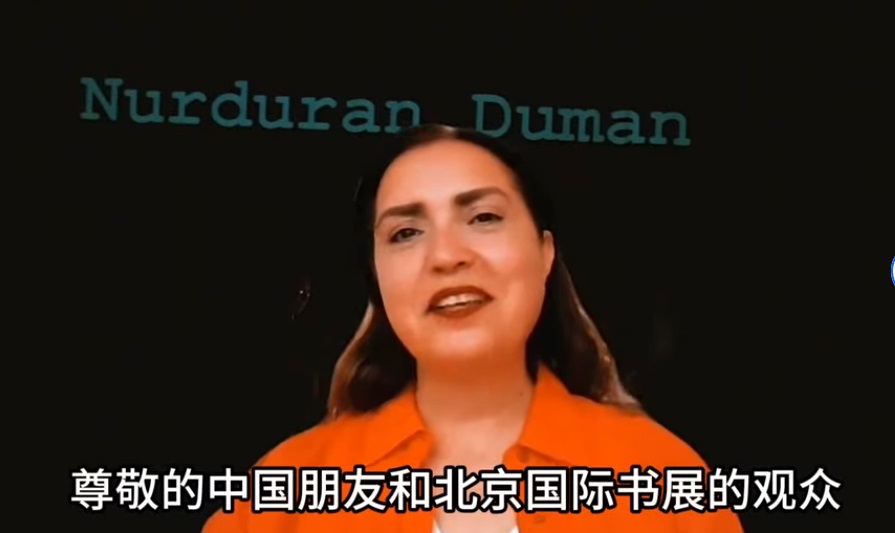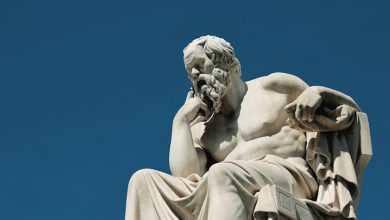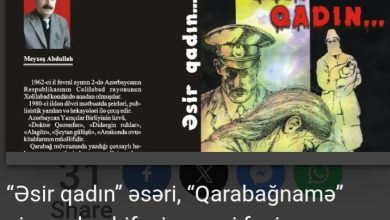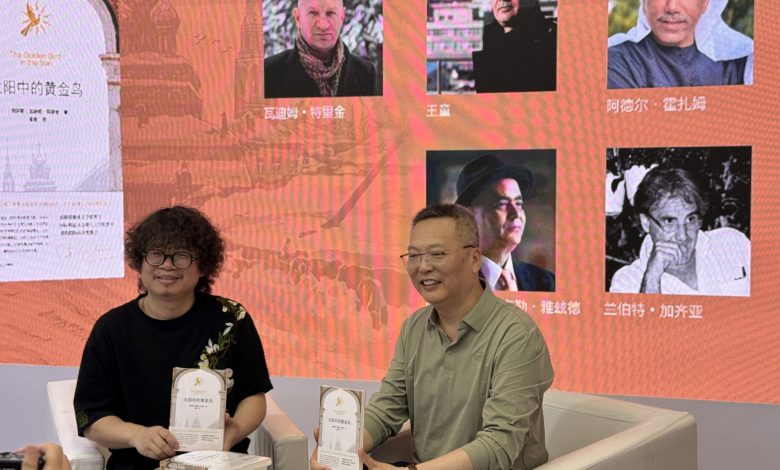
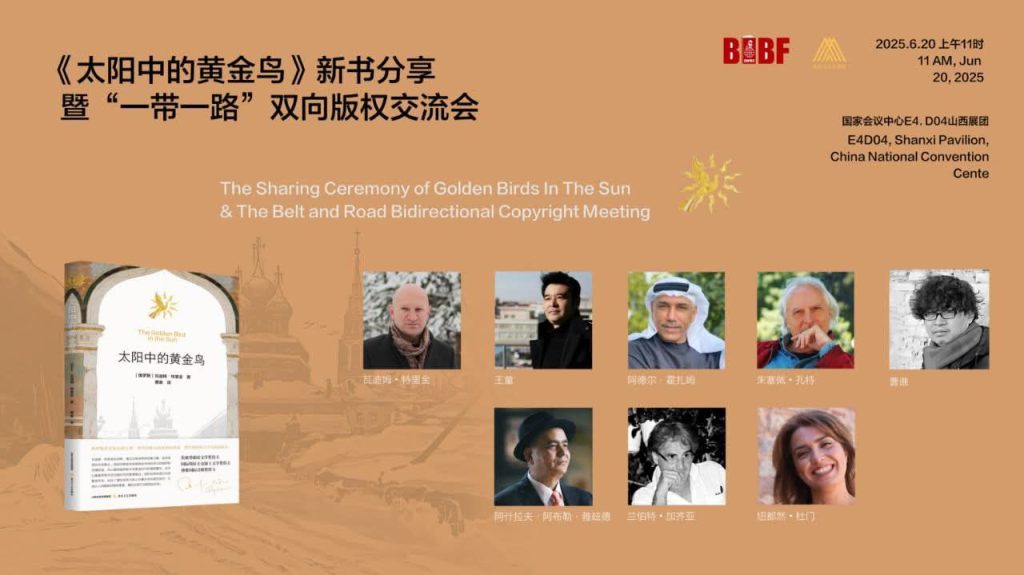 At the 31st Beijing International Book Fair on June 20th, the literary world witnessed the celebrated debut of The Golden Bird in the Sun, a translated collection of poems by the Russian poet Vadim Terekhin, rendered into Chinese by the acclaimed writer and translator Cao Shui. The launch was hosted in the Shanxi exhibition hall at the National Convention Center, under the auspices of the Shanxi Publishing and Media Group and Beiyue Literature and Art Publishing House.
At the 31st Beijing International Book Fair on June 20th, the literary world witnessed the celebrated debut of The Golden Bird in the Sun, a translated collection of poems by the Russian poet Vadim Terekhin, rendered into Chinese by the acclaimed writer and translator Cao Shui. The launch was hosted in the Shanxi exhibition hall at the National Convention Center, under the auspices of the Shanxi Publishing and Media Group and Beiyue Literature and Art Publishing House.
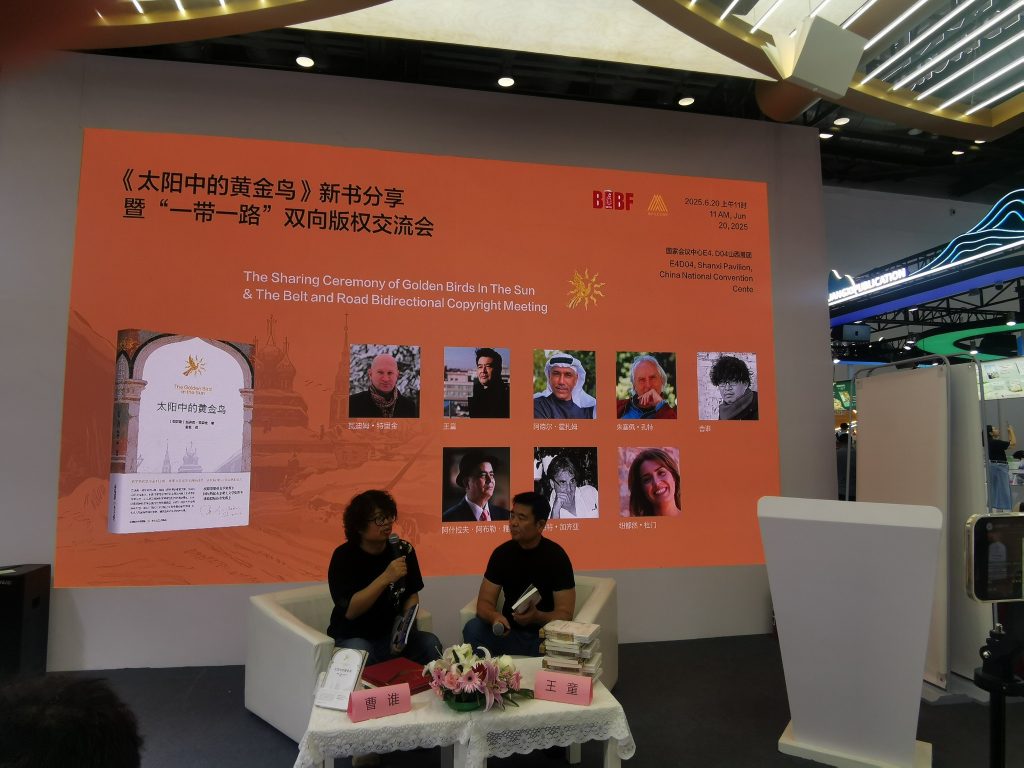 In conjunction with the unveiling, a ceremonial signing marked the official translation of five major works, including The Epic of Eurasia, as part of a broader initiative for two-way copyright exchange along the Belt and Road. The event drew a distinguished gathering of literary figures, editors, and cultural advocates. Among them were Dong Runze, Deputy Director of Publishing at Shanxi Publishing and Media Group; Dong Libin, President and Editor-in-Chief of Beiyue; Song Wei of Shanxi Science and Technology Publishing House; Liu Wenfei, Deputy Chief Editor of Beiyue; Zhang Jianjun, Executive Chairman of the Beijing International Poetry and Film Festival; Wang Tong, poet and former assistant to the president of Beijing Literature; and Han Lanna, reader representative. Cao Shui himself, Chinese Coordinator of the BRICS Writers Association and Asian Coordinator of the World Poetry Movement, stood at the heart of the event.
In conjunction with the unveiling, a ceremonial signing marked the official translation of five major works, including The Epic of Eurasia, as part of a broader initiative for two-way copyright exchange along the Belt and Road. The event drew a distinguished gathering of literary figures, editors, and cultural advocates. Among them were Dong Runze, Deputy Director of Publishing at Shanxi Publishing and Media Group; Dong Libin, President and Editor-in-Chief of Beiyue; Song Wei of Shanxi Science and Technology Publishing House; Liu Wenfei, Deputy Chief Editor of Beiyue; Zhang Jianjun, Executive Chairman of the Beijing International Poetry and Film Festival; Wang Tong, poet and former assistant to the president of Beijing Literature; and Han Lanna, reader representative. Cao Shui himself, Chinese Coordinator of the BRICS Writers Association and Asian Coordinator of the World Poetry Movement, stood at the heart of the event.
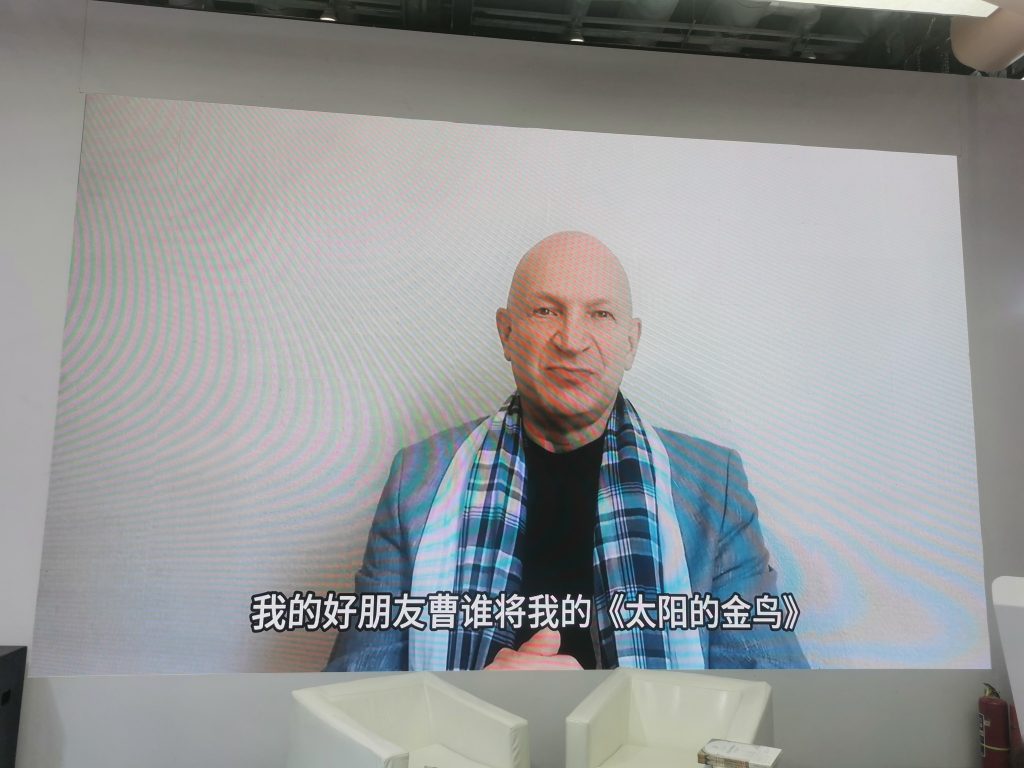
The Golden Bird in the Sun gathers two hundred of Terekhin’s lyrical miniatures—poems that find the eternal within the everyday. His work bears the imprint of Russia’s rich literary lineage, echoing the classical grace of Pushkin’s golden age and the symbolic depths of the silver age. It also bridges East and West, infused with a spirit of justice and compassion that resonates in our globalized era.
Liu Wenfei, opening the ceremony, hailed both Terekhin and Cao Shui as vanguard poets on the world stage. He noted that in 2023, Beiyue initiated a cultural outreach project in cooperation with the Cuban Writers Association, launching Spanish editions of Chinese poetry abroad—among them The Epic of Eurasia. In 2024, Beiyue and Cao Shui co-organized the World Poetry Future Symposium, which drew international attention from both the literary and media communities. These efforts reflect a growing “circle of friends” forged through shared artistry.
Joining virtually, Vadim Terekhin extended warm thanks to his translator and the publishers, calling the book’s release a gesture of cultural friendship. “On behalf of all Russian writers, I greet you and celebrate this moment,” he said. “This book, The Golden Bird in the Sun, is now a bridge between our peoples. My deepest gratitude to Cao Shui—my friend, my translator—and to all who made this possible. May this effort bring us closer, enrich our understanding, and deepen the enduring bond between Russia and China. I wish you all love, health, and inspiration. Long live our friendship!”
Thus, amid pages and poems, the Golden Bird took flight in Beijing—its wings bearing a message of peace, poetry, and cross-cultural kinship.
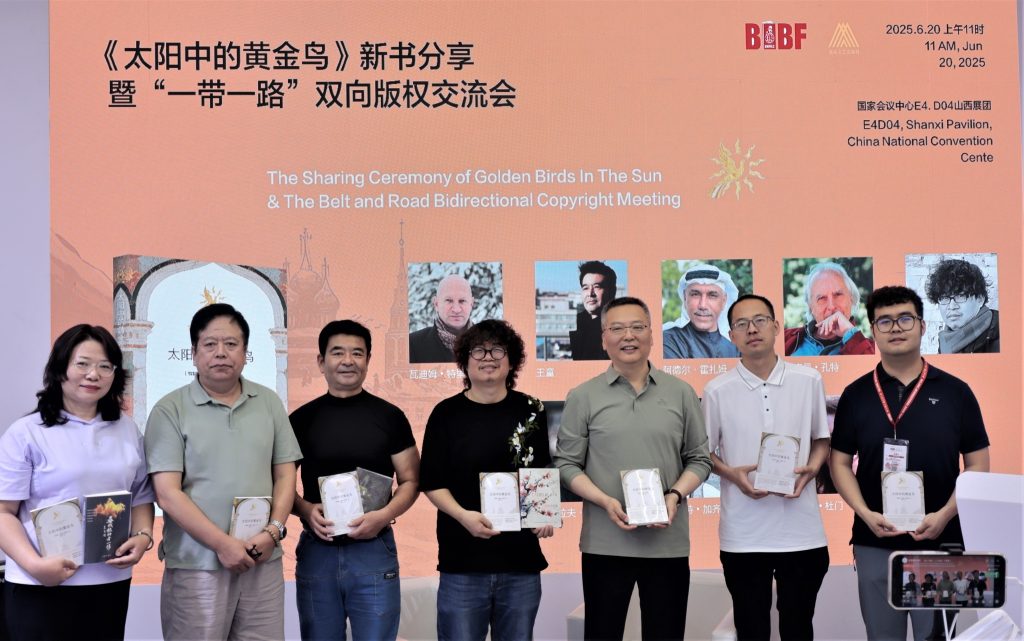
“Of Stars and Verses: A Gathering of Poets in Beijing”
At the literary gathering in Beijing, Cao Shui and Wang Tong engaged in a thoughtful dialogue on Vadim Terekhin’s poetic vision, situating it within the broader context of Russian literature’s international aesthetics. Cao Shui remarked that Russian poetry, rich in philosophical gravitas and formal innovation, is a confluence of global cultural absorption and unique national spirit. Vadim’s verse, he said, carries an enduring appeal — a luminous call for goodness, justice, and freedom — and transcends the confines of time and geography, forging a deep kinship among peoples across cultures and continents.
Wang Tong added a fascinating detail: Vadim, before fully devoting himself to poetry, was an aerospace engineer who once studied rocket science. His understanding of space became a metaphorical vessel for his humanistic longings. To read his poetry, Wang suggested, is akin to reliving the 108-minute voyage of Gagarin’s historic flight — lyrical, weightless, cosmic. This seamless fusion of space exploration and poetic intuition gives rise to what Wang termed an “interstellar lyricism.” Notably, Vadim’s poem The Golden Bird in the Sun was composed during his 2019 visit to Sanxingdui, China, inspired by the artifact known as the “Golden Ornament of the Sun God Bird.” This work stands as a radiant symbol of cultural dialogue between China and Russia. Moved by its resonance, Wang recited the poem impromptu, evoking heartfelt applause.
Cao Shui, in a speech titled “Chinese Poets Must Embrace Global Poetic Forms”, urged fellow poets to expand their reading beyond the confines of European modernism of a century past. “We live now in the age of world literature,” he said. “Chinese poets often invoke Pound, Eliot, and Rilke — all titans, yes, but from a time long gone, and only from one corner of the world. Our gaze must turn to the living voices of five continents — Europe, Asia, Africa, the Americas, and Oceania.”
He spoke of his ongoing mission to translate the works of contemporary poets into Chinese, thereby widening the literary lens for Chinese readers and writers. In 2023, he translated The Song of the Dream Land by Colombian poet Fernando Rendón. This year, he brought The Golden Bird in the Sun to Chinese readers. In the current publishing season, he has signed translations for Footsteps of Istanbul by Turkish poet Nurduran Duman, The Song of the Knight by Italian poet Lamberto Garzia, and Manseerah (Epic of Humanity) by Emirati poet Adel Khozam. He expressed heartfelt gratitude to Beiyue Literature and Art Publishing House for their expansive vision and unwavering support of global poetry.
Cao Shui then reflected on the two chief barriers facing Chinese poets on the global stage: language and worldview. Overcoming them, he argued, demands a systemic understanding of world civilizations. His own work, Epic of Eurasia, is undergoing translation into several languages: English by American poet George Wallace, Italian by Lamberto Garzia, Spanish by Yasef Ananda and Roberto Aedo, Arabic by Egyptian poet Ashraf Aboul-Yazid — with Russian, Korean, and Bengali versions under discussion.
“This is not a national epic,” he clarified, “but an epic of the Eurasian continent — the cradle of humanity. It moves westward from Babylon to Canaan, Egypt, and Greece, and eastward to Persia, India, and China. Its central idea is this: humanity shares a single origin and moves toward a shared future. We must reintegrate Chinese civilization into the larger framework of global civilization. Imagine world civilization as a mighty tree — its seven roots are Babylon, Persia, India, China, Canaan, Egypt, and Greece. Only when poets understand the architecture of this tree can emotional resonance and cultural transformation flourish among them. This is the foundation for world literature’s next age.”
A poetry film based on Vadim’s poem Autumn Colors was screened during the event, drawing attention to the fusion of image and verse. Zhang Jianjun, Executive Chairman of the Beijing International Poetry and Film Festival, explained the festival’s mission: to pioneer the visual translation of lyrical poetry, explore artistic synergy between poetry and cinema, and offer a cross-cultural platform that elevates Chinese poetry onto the global stage through multimedia innovation.
The event also celebrated Wang Tong’s recent honor — the 108 Minutes in Space Poetry Award, bestowed by the Russian Space Agency and the BRICS Writers Association. Cao Shui presented the certificate on their behalf. In his acceptance speech, Wang shared his deep affinity for the prize: “To receive the Russia 108 Minutes award is not merely a personal achievement, but an emotional homecoming. As the so-called ‘space poet,’ I have often invoked Gagarin in my work. He was not only the first man in space, but a symbolic threshold in human civilization.”
He continued, “The idea of soaring with Gagarin for 108 minutes, carried by poetry, stirs a sublime joy in me. That this recognition comes through Mr. Cao Shui, my colleague and a fellow torchbearer for global poetic dialogue, deepens the symbolism. Chinese culture must interface with global civilization — like spacecrafts docking in the vast cosmos, the stars and the sea stretching beneath us.”
Thus concluded an event where poetry, translation, and imagination converged — an ode to the golden birds of thought taking flight across the borders of nation and language, toward a shared literary constellation.
Verses Across Borders: A Celebration of World Poetry and Cultural Exchange”
Amid the rich tapestry of the event, attendees were also introduced to the bilingual volume Language and Soul: A Collection of Russian-Chinese Literary Works, published by The Four Publishing House in Russia. Edited with great care by Alina Rodniakova, the anthology presents the voices of forty distinguished contemporary Russian poets and writers. This collection stands not only as a testament to the creative vigor of Russian letters, but as a living witness to the enduring literary friendship between China and Russia.
Within the broader pursuit of sharing Chinese culture with the world, Beiyue Literature and Art Publishing House has carved out a place of distinction. For ten consecutive years, it has been named among the “Top 100 Influential Publishers of Chinese Books Overseas,” a recognition of its steadfast dedication to global cultural dialogue. Its partnerships span continents—embracing the United Kingdom, Russia, Italy, Egypt, and Cuba—and its efforts have resulted in the export of over fifty literary copyrights in recent years, covering languages such as English, Russian, Arabic, Italian, Japanese, and Traditional Chinese. Editorial collaborations now extend to offices in Italy and Taiwan.
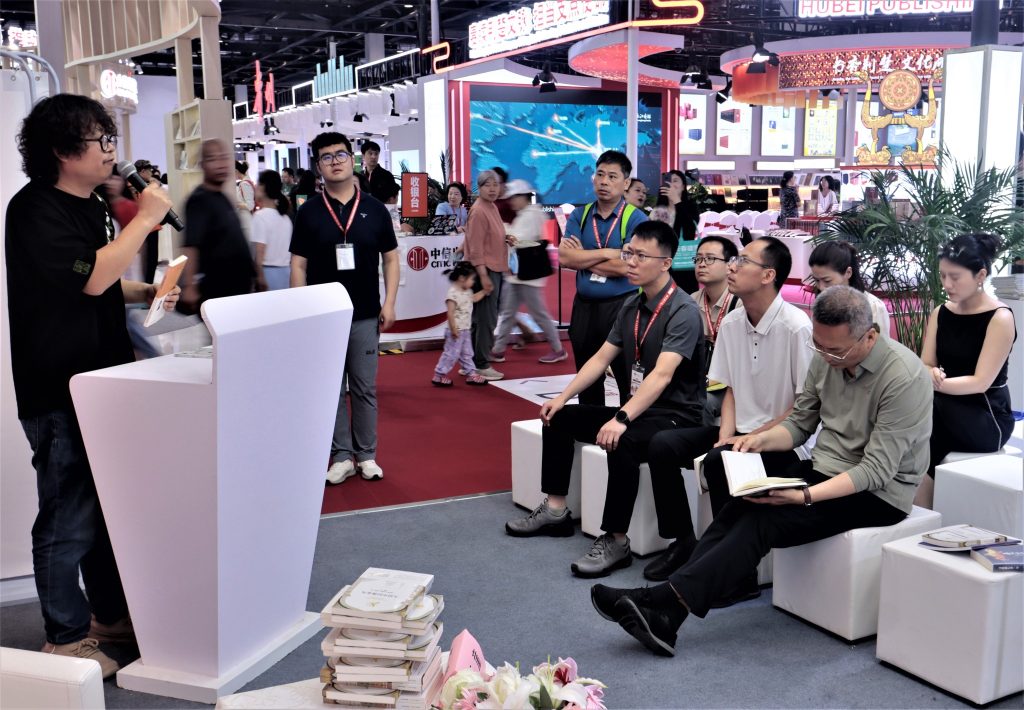
Beiyue is also a committed partner in the World Poetry Movement, an international alliance founded by the organizers of thirty-seven major poetry festivals. This movement, now active in 135 countries, champions global linguistic diversity and calls for the creation of a “human poetic community”—a realm of shared imagination that transcends ethnicity and ideology, where poetry serves as a bridge to peace.
A highlight of the gathering was the Italian copyright signing ceremony for Cao Shui’s Epic of the Eurasia. Italian poet and statesman Giuseppe Conte, in his remarks, praised the work as a fusion of philosophical reflection and epic grandeur—rooted in myth, history, and intellect—and compared its achievement to the legacy of Dante and the artistic brilliance of the Renaissance. The Italian translator, Lamberto Garzia, expressed his enthusiasm for the translation project, promising its completion by the end of 2025 or early 2026. He then recited two selections in Italian, drawing the audience into the cadence of the original verse.
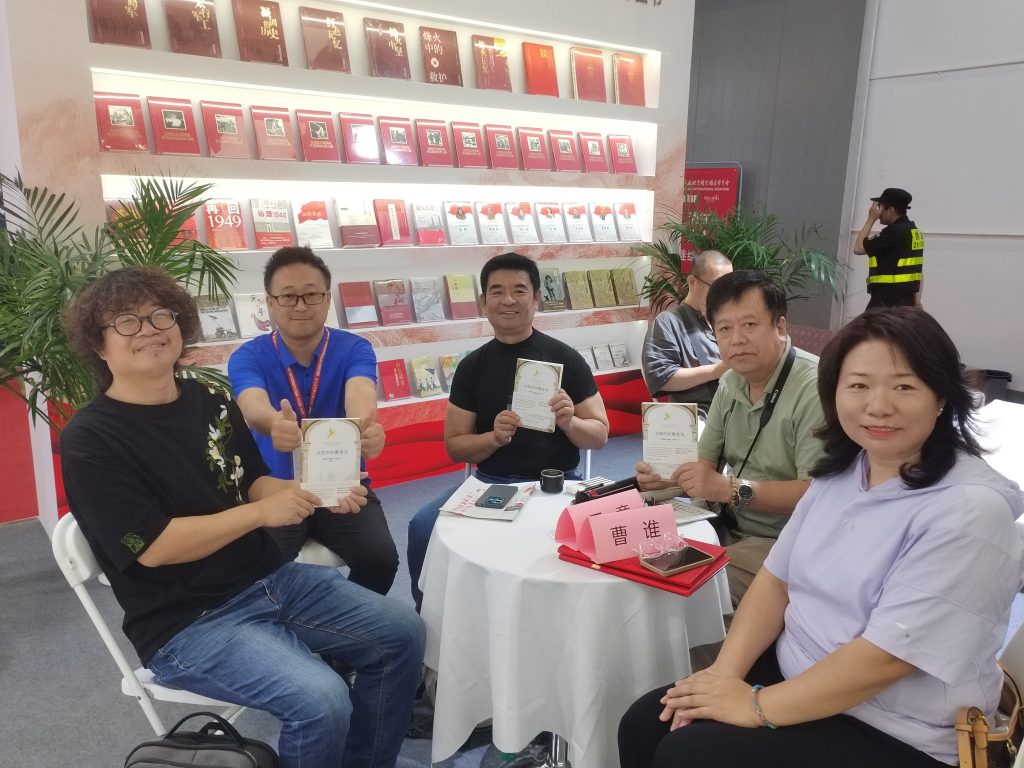
Cao Shui presented early drafts of the Italian version and spoke about his ambition to forge a poetic voice that gives resonance to human dignity and freedom. Epic of the Eurasia, he emphasized, is not merely a national epic but a continental one—mapping the spiritual geography of human civilization from Babylon and Egypt to Persia, India, and China.
The epic has also recently been granted Arabic copyright. Egyptian poet and translator Ashraf Aboul-Yazid lauded Cao Shui’s work as a modern epic that transcends civilizational boundaries. He announced plans to include the Arabic edition in the Egyptian Silk Road Literature Series, underscoring the symbolic unity between two of humanity’s oldest cultures—China and Egypt. This translation, he noted, envisions a future built on harmony and the flourishing of shared human spirit.
This is Ashraf’s Speech:
Epic of Eurasia By poet Cao Shui (China)
Epic of Eurasia is a unique poetic project that reimagines human history through a lens that unites Eastern and Western civilizations.
It revives the traditions of epic poetry known to humanity since The Epic of Gilgamesh to the Mahabharata.In this long poem, drawing from mythologies, philosophies, and poetic traditions of both East and West,
Cao Shui creates a modern epic that stretches across civilizations—from Mesopotamia westward to Canaan, Egypt, and Greece, and eastward to India, Persia, and China.The epic is marked by structural richness, blending lyrical meditation with epic narrative.
It is presented in the era of free verse through sections infused with cosmic symbols—
such as Yin and Yang, mythical creatures, and sacred landscapes like the Kunlun Mountains and the Pamirs Plateau.Epic of Eurasia is not just a poem—it is a poetic call to rediscover our shared humanity in a turbulent world,
uniting cultures through a vast cosmic song.Since the founding of the Silk Road Literature Series in 2016, we have worked to build cultural bridges between us and the world,
especially with East Asia, by publishing original works and translations of literary icons.We believe that Epic of Eurasia will be the crown jewel of these publications,
to be celebrated on the tenth anniversary of the series.This cooperation is not only between two poets—from Cairo and Beijing—
nor merely between two publishing houses in Egypt and China.Rather, this translation represents a bridge between two ancient civilizations:
the Egyptian and Chinese civilizations—
both immortalized by history and flourishing through the creative spirit of humanity.Thank you, Cao Shui.
Thank you, Beijing International Book Fair.
Thank you, Beiyue Literature and Art Publishing House Co., Ltd.
And thank you all.Ashraf Aboul-Yazid
Editor-in-Chief of the Silk Road Literature Series,
Secretary General of the Congress of African Journalists.
Yet the spirit of exchange was not unidirectional. The event also celebrated the Chinese publication rights of three international works: The Footsteps of Istanbul by Turkish poet Nurduran Duman, The Song of the Knight by Italian poet Lamberto Garzia, and The Epic of Humanity by Emirati poet Adel Khozam. Each of the authors, in heartfelt remarks, shared their admiration for Chinese culture and the joy of seeing their works embraced by Chinese readers. Cao Shui, serving as translator for all three texts, signed the translation agreements and ceremonially presented them.
To close the proceedings, the audience was treated to a preview of the Chinese translation of Epic of Humanity – Great Epics from Around the World, a poetic compendium curated by Adel Khozam. This monumental collection gathers the voices of eighty-six poets from across the globe. The Arabic edition premiered in Beijing the year prior. Symbolically, Khozam penned the opening poem while Cao Shui composed the concluding one, weaving a literary dialogue that spans continents and cultures.
The Belt and Road initiative has proven more than a geopolitical venture—it has become a stage for cultural encounters, where poetry, translation, and mutual respect take center stage. Copyright exchange, a cornerstone of this initiative, plays a vital role in deepening the global flow of artistic expression. Through such exchanges, readers across the world gain access to poetic masterpieces rooted in diverse histories and emotional landscapes.
These cross-cultural currents not only enrich global poetry, but also inspire new strategies for publishers—stimulating innovation in editorial planning, outreach, and literary curation. At the heart of Beiyue Publishing’s mission lies the nurturing of modern poetry, and through projects like public interest reading initiatives and Belt and Road literary dialogues, the house continues to offer wisdom, imagination, and dedication to the unfolding story of world literature.
In the spirit of shared beauty, a new chapter begins—where poets from all lands write not merely for their nations, but for humanity.

